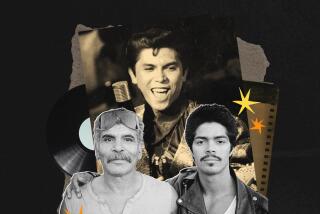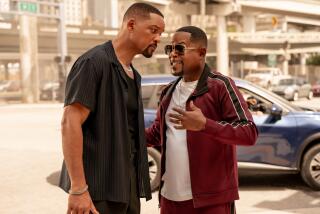Review: ‘Creed’ is a fresh retelling of ‘Rocky’ that has us in its corner
What becomes a legend most? Ryan Coogler knows.
Fresh from “Fruitvale Station,” his impressive, Sundance Grand Jury Prize-winning debut, writer-director Coogler presents the very different “Creed,” a film that is nominally a spinoff of the celebrated “Rocky” series but actually plays like something more interesting: a spiritual remake of the 1976 film that retells the original story in the kind of involving way one would not have thought possible.
That’s because, after six previous films made over a period of 30 years, a viewer would be forgiven for thinking that this venerated series had fought its final round. Even Rocky Balboa’s creator and chronicler, Sylvester Stallone, apparently thought so himself.
The actor, who wrote and starred in all six of those movies (and directed four), has admitted he was leery of having the series revived and taking on a new role as aging mentor to up-and-coming fighter Adonis “Donnie” Johnson, who just happens to be the illegitimate son of Rocky’s rival turned BFF Apollo Creed.
------------
For the record, 11:40 a.m. Nov. 25: An earlier version of this post said that Stallone wrote, directed and starred in all six previous “Rocky” films. He directed four. The original and fifth were directed by John G. Avildsen.
------------
But Coogler, who came up with the story and wrote the script with Aaron Covington, was persistent, and he had several factors on his side. These include a lifelong passion for a series he’d shared with his father growing up and a deep familiarity with the details of the previous films that reveals itself in numerous references large and small contained in “Creed.”
Coogler also has a close relationship with Michael B. Jordan, the talented star of “Fruitvale Station” and a committed, athletic actor (“Friday Night Lights”) who trained for nearly a year to look the part of a trim and vigorous boxer and threw himself with equal vigor into the film’s emotional demands.
Coogler’s greatest asset, however, was his own skill as a director, his gift for bringing a combination of understated naturalism and involving storytelling to the screen. “Creed” rescues the Rocky series from the bombast of the later films and reclaims the overlay of emotion that was its birthright way back when.
This particular story begins in 1998, when a pre-teen Adonis, angry that his father died before he was born and his mother abandoned him, is fighting everyone he can get his hands on, even in a juvenile detention facility. Showing up to rescue him is Mary Ann Creed, his father’s widow, nicely played by Phylicia Rashad. She adopts Adonis, raises him in the Baldwin Hills mansion she shared with Apollo and tries to give him a sense of a world beyond using his fists.
But though the adult Adonis has a good job at a Los Angeles financial firm, he is still sneaking off to Tijuana on weekends to fight in tiny clubs. Searching for a way to connect with the father he never knew, and whose name he resists taking, he quits his job and heads to Philadelphia to seek out Rocky Balboa, the man whose relationship with Apollo Creed played out in four out of the six films.
Rocky, of course, is not hard to find. A Philadelphia legend, he still runs Adrian’s, the memorabilia-filled restaurant named after his late wife, still goes out to the cemetery to talk to the graves of Adrian and her brother Paulie, and still wears pork pie hats (but not because he’s a hipster).
What Rocky, older, slower and thick around the middle, doesn’t do anymore is deal with boxing. Convincingly played by Stallone, who at this point doesn’t act the character so much as simply be him, Rocky wearily tells Adonis: “Time takes everybody out. It’s undefeated.”
But Adonis, desperate for the formal ring training he’s never had, is not so easily put off. He goes to work out at Rocky’s former home base, Mighty Mick’s Boxing Gym, where the guys call him Hollywood and the top dog is ranked light heavyweight Leo “The Lion” Sporino (real-life boxer Gabriel Rosado).
Also taking up Adonis’ time is Bianca (Tessa Thompson), the aspiring singer he meets cute in his apartment building when he rousts her for playing music too loud. They even go out together for cheesesteaks, which is about as Philly romantic as you can get.
Before you know it (there wouldn’t be any movie if he didn’t), Rocky is helping Adonis out, cluing him in to old-school training methods like chasing chickens to increase your speed and doing lots and lots of roadwork. Rocky also does not stint on the homilies, one of his favorites being “one step at a time, one punch at a time, one round at a time.” Hard to argue with that one.
Just as Apollo Creed loomed on the horizon in the original film after Rocky’s fight with Spider Rico, yet another champion, Britain’s “Pretty” Ricky Conlan (Anthony Bellew, another real fighter), hovers menacingly in the distance.
But first, Adonis and Rocky have stuff to resolve, including areas involving Rocky’s personal situation and those having to do with Adonis’ issues about abandonment and reconnection.
When it finally comes down to what happens in the ring, “Creed” knows what it’s doing. Director of photography Maryse Alberti (“The Wrestler”) is expert at bringing the action alive, even photographing one fight in a single, two-minute Steadicam shot, and real-life ring habitués such as Ricardo “Padman” McGill and Jacob “Stitch” Duran add an air of authenticity to Adonis’ entourage.
Within the inevitable boundaries of a venerable franchise (this is a “Rocky” film, after all), Coogler and company do fine work convincing us against our better judgment that nothing we see is preordained, that anything can happen within the four corners of the ring. You can’t ask a “Rocky” film to do more than that.
-----------
‘Creed’
MPAA rating: PG-13, for violence, language and some sensuality
Running time: 2 hours, 12 minutes
Playing: In general release
More to Read
Only good movies
Get the Indie Focus newsletter, Mark Olsen's weekly guide to the world of cinema.
You may occasionally receive promotional content from the Los Angeles Times.











